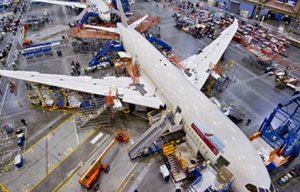
New life for airplane structure material
Boeing 787 components recycled using a pyrolysis process.

19th December 2023
Innovation in Textiles
|
Japan
Carbon fibre from the production process of the Boeing 787 is being recycled by Toray Industries and integrated into Lenova laptops.
The recycled carbon fibre (rCF) is recovered from the manufacturing of Boeing 787 components made with Toray’s Torayca and recycled using a pyrolysis process. It is already being used in the Lenovo ThinkPad X1 Carbon Gen 12 as a reinforcement filler for thermoplastic pellets and Lenovo will continue to collaborate to expand its usage of the rCF in other products.
“Lenovo is committed to implementing sustainable practices and strives to make a positive social and environmental impact through our business,” said executive director Yasumichi Tsukamoto. “Working with Toray and Boeing to integrate recycled carbon fibre material into our next generation ThinkPad X1 is another step in our transition to a circular economy.”
Collaborating with universities and industry, Boeing has helped advance technology for recovering carbon fibre from composite materials – diverting it from landfill and creating a market for this high-value recycled material as feedstock for new products, including laptop casings. Using carbon fibre composite materials on Boeing planes meanwhile reduces weight, increasing fuel efficiency.
Torayca is an established aerospace material known for its high strength, stiffness and lightweighting properties. These qualities have led to its adoption in other applications such as electrical and electronic equipment housings and sports equipment.
A key advantage of carbon fibre is the ability to retain its primary mechanical properties even after the recycling process. Toray is actively advancing recycling technologies and establishing a strategic business model for rCF. Given that the carbon footprint of rCF is lower than that of virgin carbon fibre, Toray is proactively recommending its adoption to reduce the environmental impact of customer products.

Business intelligence for the fibre, textiles and apparel industries: technologies, innovations, markets, investments, trade policy, sourcing, strategy...
Find out more